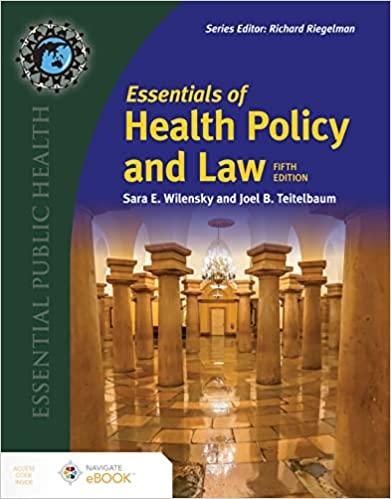Question
READ ARTICLE THEN ANSWER QUESTIONS Terry Bracy: Hard times for Congress According to recent polling, only 20% of Americans approve of Congress. Conversely, 75% of
READ ARTICLE THEN ANSWER QUESTIONS
Terry Bracy: Hard times for Congress
According to recent polling, only 20% of Americans approve of Congress. Conversely, 75% of the public support the social programs the current Congress is proposing. How is this apparent contradiction explained?
One opinion circulating in academic circles is that in an era of tribal politics, performance in office doesn't matter when it comes to elections. Many political scientists believe that the current cultural divide is too strong to be overcome by successful advocacy of popular legislation. In this environment, no attempt at bipartisanship goes unpunished, leading incumbents to retreat to the safety and isolation of party caucuses.
Were this political standoff to exist in other eras, it is possible that Arizona might never have received federal approval of the Salt River Project, the Central Arizona Project or the Hoover Dam. The ability of partisans to work together and share credit is the DNA of our governing system.
Another theory is that Congress is the victim of the media age. The legislative process with its bargaining and bickering does not generate an entertaining script for prime-time viewing. And yet we are treated to every twist and turn, every cross word and insult, and every one-sided diatribe uttered to raise funds. The Republican media machine led by Fox News is particularly adept at grinding any Democratic legislative plank into dust before beneficiaries can grasp its true meaning. The Democrats' poor cousin MSNBC is a less successful version of the same strategy. The net result has been a brazen attack on truth which has undercut the validity of all institutions, but especially Congress.
Today's press corps has contributed profoundly to Congress' negative image. On a day last week when the House passed the most important social legislation in 60 years, at least as much coverage was devoted to the antics of Rep. Paul Gosar, who was censured for posting death threats on Twitter. Reporters now hire publicity agents to get them on cable television and teach them strategies that will maximize their clicks on social media platforms hardly a formula for sober discourse.
Perhaps another reason that Congress has fallen into disrepute are its decades of relative inaction as the presidency grew in power. The founders didn't believe that the legislative branch, with its fusion of egos and ambition, would simply acquiesce to the influence of the executive. Quite the contrary. To guard against congressional dominance, James Madison designed a bicameral institution comprising the House and Senate. He may have succeeded too well. When the Senate added the filibuster in 1837, it soon became evident that a single senator could bring the nation's agenda to a halt. Congress too often was unable to do the people's business.
Against these realities stands the energy and wisdom of perhaps the greatest House speaker since the reign of Clarence Cannon more than a century ago. Nancy Pelosi, an octogenarian and the mother of five, with only a handful of votes to spare, has guided to passage the most important piece of social legislation since Franklin Roosevelt.
The Build Back Better bill invests $2 trillion on America's future. Parents with children will receive a monthly stipend of at least $300 to help with the cost of raising a kid. Free preschool will be available to all. Prescription drugs will be cheaper. Old folks will have ready access to caretakers so they can stay at home. American manufacturers of electric vehicles get a huge boost through the tax system, as electric charging stations are built across the country. Carbon-free energy sources such as solar will be subsidized in order to transition homes and businesses to clean power. And there is more, much more.
While the majority of Americans support this bill, a loud minority see it as the dawn of socialism. One thing is for certain: this legislation, along with the recently-passed infrastructure bill, will change the way Americans live. It will be interesting to see if it changes our attitudes toward Congress as well.
- The American right has long argued decried what they describe as "liberal" SC justices that "legislate from the bench."
What do these proponents mean by this statement? What are the historic precedents underlying this conflict? Do you agree with this statement? Why? Why not?Can the American Left make the same argument regarding the judicial record of the "conservative" justices?Why? Why not?
Step by Step Solution
There are 3 Steps involved in it
Step: 1

Get Instant Access to Expert-Tailored Solutions
See step-by-step solutions with expert insights and AI powered tools for academic success
Step: 2

Step: 3

Ace Your Homework with AI
Get the answers you need in no time with our AI-driven, step-by-step assistance
Get Started


